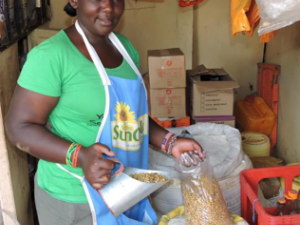Catherine Wangui (OXFAM UK)
|
Image

|
Name:Catherine Wangui Age: 28 years Project Sector: Organisation and mobilisation of target groups; Facilitating linkages with business development service providers (Small scale trader in the target area) Implementing Partner: Oxfam UK Location: Kibera informal settlement in Nairobi County Project details: link |
|
What was life like for people living in the area before the project? Before the project Catherine was working in a hotel earning Kes.300 (2 GBP) a day and not saving. The earnings were not enough to feed her family and take her daughter to school. To supplement her income she started a small grocery shop with a loan from friends. What is life like for people as a result of the project? Through support from the project, in July, she joined a women’s group called ‘sacred heart’. Catherine says that through her group she is able to save at least Kes. 200 (1.30 GBP) per week. With this money she hopes to secure a loan that will enable her to expand her grocery and cereals business, and thereby to pay back her first loan, to improve the nutrition of her family, to pay house rent, to pay levies and fees to the County, to pay the rent for her business premises and to pay school fees for her daughter and her siblings. What difference has the project made to people’s lives? Catherine’s group and other similar ones within the target areas have been linked to government devolved funds-UWEZO. This has enabled her group to apply for a loan of Kes. 150,000 (965 GBP). As a group, if they are successful, they hope to use these funds to increase their table banking funds.[1] This will enable more members to borrow and expand their businesses. The Uwezo fund allows the group a six month grace period before repayment which in turn gives their businesses time to grow. Quote from the beneficiary “I see the trainings planned by the Wezesha Jamii project and the partner institutionsto be sustainable as opposed to previous initiatives that give us handouts with no skills which left us poorer than we were before”. [1]Table-banking is a group funding strategy where members of a particular group meet once every month, place their savings, loan repayments and other contributions on the table then borrow immediately either as long term or short term loans. The women use the money borrowed as capital for their livelihood projects |
